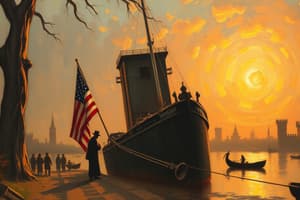Podcast
Questions and Answers
What was a significant consequence of the United States' victory in the Spanish-American War?
What was a significant consequence of the United States' victory in the Spanish-American War?
- The United States became a global imperial power. (correct)
- The United States gained independence from Europe.
- The United States formed an alliance with Spain.
- The United States lost its last colony.
Which of the following was a major argument made by supporters of imperialism in the United States?
Which of the following was a major argument made by supporters of imperialism in the United States?
- That it was morally wrong to expand U.S. territory.
- That it would reduce the country's military power.
- That it would decrease U.S. involvement in international affairs.
- That it would lead to economic growth and increased global influence. (correct)
What was the primary reason for the United States' entry into the First World War?
What was the primary reason for the United States' entry into the First World War?
- To maintain the balance of power in Europe.
- To avenge the sinking of the Lusitania. (correct)
- To support the Russian Revolution.
- To protect its colonies in the Caribbean.
Why did the United States Senate reject the Versailles Treaty?
Why did the United States Senate reject the Versailles Treaty?
What was the significance of the Panama Canal in terms of U.S. foreign relations and economic growth?
What was the significance of the Panama Canal in terms of U.S. foreign relations and economic growth?




